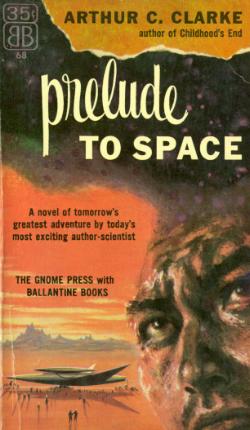"Prelude to Space" by Arthur C Clarke
Clarke’s first novel, the 1951 Prelude to Space is a hugely hopeful and inspiring novel. It follows Dirk, an American historian who is annexed into following the activities of an institution that calls itself ‘Interplanetary’. His task is to observe their activities and to produce an impartial history for posterity. The organisation, funded variously through commercial backers, private money, and government donations is dedicated to making the first manned mission to the moon. Written 17 years before the first successful moon-shot by NASA, this book retains much of the early optimism and idealism that was felt during the post-war scientific boom.
The book follows the preperations for the flight from the science and training, conducted in secret in the heart of London, to the launch of the vehicle from the Australian desert. Along the way Clarke explains the science and theory behind the concept in an accessible and engaging way, but most importantly he looks at the motivations of the people who are engaged in the attempt. Backed as they may be by commercial speculators, he finds a passion and a vision in the men of science who are so often regarded as emotionless and dry calculators. The title itself refers to the Moon, which Clarke and the characters in the book regard as merely a stepping stone, somewhere to build a forward colony in order to explore the solar system and make manned missions to other planets more feasible. In the light of subsequent space exploration this could have come across as naive and overly optimistic, but that very optimism is catching. Clarke gives such good reasons for exploring the solar system, not least of which is the idea that it will be a great liberator for humanity, that one wishes that history had followed Clarke’s book.
Clarke here is putting forth not just a scientific concept, nor indeed is he making an appeal for a lack of frontiers in space (which, as he points out in the preface, actually came true). Overall, he is writing a story, and for a man of his obvious scientific talents it is clear from the off that he also possesses immense literary talent. The story is engaging, believable and, most surprisingly perhaps, fun. What could have been a dry catalogue of didacticism and scientific propaganda becomes a novel in the true sense of the word in Clarke’s hands without once tipping over into naff pulp. It is often said that some of the best scientists of our age are inspired to their trade by science fiction novels, and after reading Prelude to Space one can fully understand why as the books vision remains powerful even 60 years after its original publication. (Paul Ballard, Snake Oil Review)
The book follows the preperations for the flight from the science and training, conducted in secret in the heart of London, to the launch of the vehicle from the Australian desert. Along the way Clarke explains the science and theory behind the concept in an accessible and engaging way, but most importantly he looks at the motivations of the people who are engaged in the attempt. Backed as they may be by commercial speculators, he finds a passion and a vision in the men of science who are so often regarded as emotionless and dry calculators. The title itself refers to the Moon, which Clarke and the characters in the book regard as merely a stepping stone, somewhere to build a forward colony in order to explore the solar system and make manned missions to other planets more feasible. In the light of subsequent space exploration this could have come across as naive and overly optimistic, but that very optimism is catching. Clarke gives such good reasons for exploring the solar system, not least of which is the idea that it will be a great liberator for humanity, that one wishes that history had followed Clarke’s book.
Clarke here is putting forth not just a scientific concept, nor indeed is he making an appeal for a lack of frontiers in space (which, as he points out in the preface, actually came true). Overall, he is writing a story, and for a man of his obvious scientific talents it is clear from the off that he also possesses immense literary talent. The story is engaging, believable and, most surprisingly perhaps, fun. What could have been a dry catalogue of didacticism and scientific propaganda becomes a novel in the true sense of the word in Clarke’s hands without once tipping over into naff pulp. It is often said that some of the best scientists of our age are inspired to their trade by science fiction novels, and after reading Prelude to Space one can fully understand why as the books vision remains powerful even 60 years after its original publication. (Paul Ballard, Snake Oil Review)


Comments
Post a Comment